- Home
- Elizabeth Bear
Bone and Jewel Creatures bajc-1 Page 8
Bone and Jewel Creatures bajc-1 Read online
Page 8
Reverently, Bijou laid the prosthesis on the bench again. Brazen pretended not to see how heavily she leaned against it, her arms bent at the elbows. “What are we going to do with them all? There’s too many.”
He looked at her, and did her the dignity of not saying, You can’t do it alone. “A little rest,” he said.
“There’s too much work.” Once she would have done it, too. He imagined her, in the privacy of her own head, cursing the swelling feet, the knotted hands, the age that slowed her. She had been an indomitable force of his childhood, his apprenticeship, and the rock he had leaned upon when he eventually broke away from Kaulas. He’d come to her first, to learn what he needed to know before he struck out on his own. With what she had told him, he could imagine how much it had cost her to treat him gently, as a beloved child. And if her rage seeped out occasionally—he had always known it was aimed at his father, and not at him at all.
“A little rest,” he said. “And let me send for my students.”
The arch of her eyebrows said it all, and the way the lines drew down on either side of her turtle-beak nose. “You don’t think I can manage.”
“I don’t think I can manage.” He laid a hand on her arm. “Bijou, sit. Rest. If you make yourself sick fighting him, he’s still won.”
Sick wasn’t what he meant, exactly, and he knew she knew it. But she frowned and sat. Sulkily, like a reprimanded child, with her arms crossed over her chest so her knobby, knitted sleeves draped lumpily from her wrists.
“The feral child has better manners,” Brazen said, gesturing to where it curled in the hearth-corner, near the cage in which its injured packmate lay breathing slow and raggedly. Under and behind the cage and bed—in the niche beside the fire and against the wall near the door to the side garden—crouched the wary shadows of the other jackals.
They were not happy, by their pricked ears and watchful eyes. But they were also not leaving.
And they had not turned aside from the food Brazen had caused to be brought for them, especially once they had seen how enthusiastically the child applied itself to the platters of grains and kitfo.
“Better manners?” Bijou glared, but could not sustain it. Her frown cracked into a reluctant smile.
He said, “Someday, when it’s a Wizard too, it can be crabby.”
“So is it to be your apprentice, then?”
He shrugged. “Who knows what it wants? Can you apprentice a child that can’t speak?”
“Can you fail to?” Bijou’s smile fell away. “But we were talking about your other apprentices.”
Brazen tipped his head. “Some of them are journeymen.”
“Whatever they are. Fetch your damned students, and let them overrun my home if that’s what makes you happy.”
“Actually,” Brazen said, “I thought we’d send the work to them. What’s the point in having an automatic carriage if I don’t put it to use? Bijou…”
She turned away, towards the open garden door. In the courtyard, Catherine settled, wings mantling whatever unfortunate creature dangled from its talons. “I’m listening,” Bijou said, pushing herself up against the table edge.
“He can keep making monsters,” Brazen said, frustrated. “But what we’re doing is as useless as building walls against encroaching dunes. Until we take control of the war, we are losing. And then there’s the question of what we are going to do with all the—” He gestured around the room, to the wounded animals, the half-assembled armatures of bone and metal and stone laid out on benches like so many blacksmith’s puzzles.
“Turn them loose,” Bijou said. “And wait for people to bring us more.”
Six
The cub has come to an understanding.
At first, the brothers-and-sisters are uncertain of their place here. The mother, in particular, fears for her cubs—but she can smell that the cub, who was sick unto dying, is sick no longer. And she can smell it as well, when the father begins to recover, and lift his head inside the bars of the cage.
When the father’s flank has sealed, and puffy proud flesh shows where soft speckled coat grew, when he has risen and begun to pace his cage, limping and staggering and dull-coated but hungry and determined—then the old creature comes and slides part of the bars of the cage aside. The mother’s ears come up, her eyes forward. Around her, the brothers-and-sisters lie or crouch or turn tensely, lips tight with worry across closed teeth, tails low slung or quivering just at the tip.
It could be a trap. The men are known for the traps they set, and some are very clever.
The father hesitates. He has crowded to the corner of the cage, furthest from where the old creature stands. Now, as she backs away—slowly, and with the dragging gait of the hip-lame—the father comes forward, hesitation-step, only to pause with one forepaw lifted just inside the cage. The threshold dares him; he lowers his head and flattens his ears.
The cub sidles forward, out of range of the mother’s teeth. She might warn it back, and it knows the doorway is safe. The cub has crossed it many times.
The cub leaps up, lightly, beside the father, who tilts his head at it. And then it leaps down, and the father follows, staggering a little when his weight hits weakened forelegs. But the cub is there to steady him. There is a static moment when the father wavers and the mother and the brothers-and-sisters lean forward, held back as if by chains and collars. Then their reserve snaps and the pack surges forward, sniffing and wriggling and surrounding the father until the cub has to put its bone and jewel arm around him and hold him up against the onslaught of relief and congratulations.
And the mother, though the cub does not think the old creature hears the thanks in it, lifts her head to stare at the old creature and fans her tail once, gently.
When dusk comes, the cub shows the pack some of the things it has learned. Such as where the den of the enemy is.
Though anyone could tell it for its stinking.
Days passed, and the stream of afflicted grew. In the mornings, at first light, Bijou would shuffle from her bedroom to find one of the door-warders had already set water to boil for coffee. She would stir the porridge—sometimes she had to pull the spoon from a servant’s hand to do so—and stump to the front door, the child by now usually beside her, and perhaps a jackal as well. When Bijou opened the portal, the cold morning would greet her—and, shivering upon the street before her house, a line of men and women: some with livestock, some with loved ones, some hunched over their own necrotizing injuries.
Bijou would treat them as best she could, the ones that were within saving. The ones that were not within saving could not be allowed to go free. But Brazen took responsibility for those; he went before the Bey and prevailed upon him to open the jails as quarantine, which the Bey could do without involving his advisors. There, those that died and would not lie down could be kept in custody.
This did not prevent some from dying untreated, of course, and soon Messaline fluttered with stinking pigeons and swarmed with necrotic rats. The river fouled and only covered cisterns stayed safe for drinking—though some must, perforce, drink the river water or go thirsty. And still Bijou’s bone and jewel creatures brought her more and more of the dead and dying.
Bijou’s unquiet loft hummed with people—the comings and goings of Brazen’s household, the child’s jackal wardens like ghosts about the garden, the sick. And, more and more, it was also busy with the recovering. Once healing had begun, many of those returned to assist with the still-sick. Lazybones hid in the attics so that Bijou hardly even heard it. The street before Bijou’s house, and for yards in every direction, took on the aspect of a fair.
The first treated animal to be released was the cat, new forelimbs silenced cunningly with tiny leather pads upon the toes. Bijou carried it to the back garden wall and set it down, stroking its ears when it twined her ankles. “Go on,” she said. “Be about your business.”
As if the work she and Brazen had put into it and its brethren had made them, like her Artific
es, capable of understanding her speech, the cat looked at her, meowed condescendingly, looked away again, and with a smooth leap mounted the garden wall.
Two hours later, it returned with the neck of a fluttering undead pigeon gripped in its teeth, the bird shedding gobs of putrescence and pecking at its eyes.
“Oh thank you,” Bijou said. “Just what I wanted.”
As she lurched forward, Brazen burst from her loft, a parchment fluttering from his fingers like a fan. By its freight of ribbons and wax, she knew the source even before he called, “Bijou! I am summoned to speak before the Bey!”
Brazen went alone, on foot, so as to seem humble. He went with the dawnlight, Iashti’s time, for a good beginning. He went in sandals and plain robes, so as to seem scholarly, but though his turban was coarse black cloth, still he wound it seven times. And having wound it, and made his sash tight, he also divested himself of all weapons.
When he presented himself before the kapikulu guarding the Bey’s gates, they searched him as carefully as he had anticipated, but they did not demand his letter of invitation before allowing him passage. It served as a small reassurance that his star had not yet fallen irretrievably.
Such things could change very fast, when it came to politics. But it seemed that they had not changed yet.
The Young Bey sat upon a gilt platform amid silken rugs and mirrored cushions, a tray resting at his right hand upon a low cradle. Kapikulu stood like skirted statues at every corner of the room, their coats as stark as the marble floor.
Aware of their gaze, and the attention of the Young Bey, Brazen lowered himself to the stones, swished the skirts of his linen robes out from under his knees, and crept forward. He thought of the jackal-child as he slid his palms across cold marble, tracing pewter-and-black veins. When his fingertips touched the edge of the platform, he paused and touched the floor with the peak of his turban.
“Your excellence,” he said. “Your unworthy servant begs your indulgence.”
“Face me,” the Bey said. Brazen pushed himself back onto his suffering knees.
“At your command,” he said, so the Bey rolled his eyes at him.
“Come, sit,” the Bey said. “And pour the coffee. Let us set aside formalities today, Brazen, and be men who were once teacher and student.”
Though he called himself a man, the Bey’s hands were as smooth as his cheeks, or the silken pillows he rested his backside on. Those hands lay upon his knees as Brazen edged up the stairs, careful never to turn his back. He sat one step below the Bey, off the cushions, and reached to pour two tiny cups of tarry coffee. The smell rising with steam from the cups was so rich and bitter it made his eyes water. There were sweets also, layered heaps of nuts and honey and threads of pastry.
Brazen served two to the Bey and chose one for himself, lifting it on a cloth napkin once the Bey had taken a bite of his own. This was a gesture of great trust, and a subtle message. The Bey had spoken as if man to man, and taken food from his hand. This conversation was not one of a subject to his ruler, but rather one between two acquaintances.
That also implied that the Bey did not anticipate that he would be able to offer any assistance, which did not surprise Brazen at all. But first there were pleasantries to be dispensed with, and so they were. And there was coffee to be sipped, and so it was.
And finally the Bey leaned down close to Brazen’s ear and spoke softly, for his hearing alone. “You have come to beg assistance against Kaulas the Necromancer.”
“It is a formality,” Brazen said.
“My advisors will not hear of interfering in a Wizard war.”
“That is as I told my old master,” Brazen said. “Also, that Kaulas set your father in his place, and when in that service he placed the Council, he placed men loyal to himself.”
The Bey sat back, a grim smile twisting his lips. “So you will understand when I tell you that I cannot give you men, or any succor or comfort when you brace him.”
“I will understand many things,” Brazen agreed. He bit down on pastry, though it might as well have been a swallow’s nest for all the pleasure it gave him. Brushing crumbs from his beard gave him a moment to school his expression. “I understand that a man faces many difficulties in life, and he cannot always choose how he meets them.”
“It is true,” the Bey said. “True and yet a source of sorrow for all devout men. Still, a great service may be remembered with gratitude.”
“Indeed,” said Brazen. “Or disquiet, in gratitude’s failure.”
Bijou knew from Brazen’s stride, from the swirl of his robes about his ankles and the way his sandals hit the floor, that the conversation with the Bey had gone no better than anticipated. But because it was expected, she laid down her corruption-soaked tools and stepped back from the current cadaver, holding fouled hands wide. “Well?” she said.
Brazen’s sigh was gusty enough that Bijou half-thought she should feel it across the loft. He broke his stride and folded his arms, choosing to stand well back from her work table.
“He says that if we kill Kaulas for him, he’ll try not to hold the favor against us.”
“Oh,” Bijou said.
Brazen nodded. “Yes. That went about as well as I expected. So what now?”
Bijou nodded to the deliquescing carcass pinned before her. “We chase Kaulas from his den, my dear one.”
Maybe now the old creature trusts the cub to return. At least, she has made the new-creatures—the ones that carry scimitars and stand as still as doors—allow the cub and the mother and the brothers-and-sisters to come and go as they please. And where they please to come and go is to and from the stinking den of the enemy.
The cub—and the mother—understand now that the old creature and her allies are pack, or at least they are pack as one might find pack in the dry season, when the lions are lean and will hunt even jackals, if they can get them. So they do what jackals do best, and at the edge of the enemy’s territory ghost from crevice to shadow, waiting for what he will do.
The cub is most tireless of the sentries, along with the mother. The mother seems to have chosen it, to rely upon its judgment now as she did not before, and this makes the cub lift its chest with pride. If the cub had a ruff and proper ears, they would be puffed up.
Instead, it leans its shoulder on the mother’s shoulder as they crouch in the shadow of a vine-hung wall out of eyeshot of the enemy’s den, but within range by even the cub’s crippled sense of smell. The cub presses its face under her neck in submission and gratitude. The mother—warm, richly scented and soft—stretches her neck and turns her head, returning the caress. And then they wait, and try to avoid the notice of the occasional vicious dead things that shamble or flutter through increasingly-deserted streets.
And wait some more, through lingering evenings and still-sharp days.
It so happens that when the enemy at last emerges from his den, the cub and the mother are crouched under that very arbor. The enemy comes forth on the last day of autumn, which falls exactly between the equinox and the solstice, in the grey light before the sun breaks over the horizon and begins sending its red fingers seeking between the walls of Messaline. On another day, the markets would be bustling in the morning cool, but some premonition must have stolen into the stall-keepers in their beds. Because the progress of the enemy’s reeking army through the streets is met by silence, barred doors and vacant streets, and heralded only by the stench of corpses and the long strides of jackals running before him.
Bijou had never heard the city jackals howl before. Certainly the jackals of the river, the ones she knew from her childhood, were anything but silent, so she knew they must be able to yip and cry and converse. But the jackals who lived within Messaline were next to ghosts, silent as shadows. So to hear their concerted cries in the street jerked her upright in her bed. Beyond the alcove curtain, Hawti rang like a carnival as it strode towards the door.
Bijou groped for her spectacles, balancing them on her nose while struggli
ng her feet to the floor.
She did not need to ask. She stood, rocking to her feet—perhaps the urgency of crisis was not a panacea after all. The previous day’s robes hung over her vanity stool. She shrugged them on, thrusting buttons through holes with an aching thumb, and faced herself in her mirror, where she made her face stern and empty.
Of course, he had waited for Kaalha’s season to pass, and Vajhir’s to begin. At least it was winter and not the killing summer. But he must have begun his campaign then.
Bijou stared at herself sternly in the mirror, and tucked her hammer in her sash before she went out to face the Necromancer, brushing past the kapikulu at her front door as if they were no more than cords of hanging coins and crystals.
Kaulas came with her bone raven on his shoulder, as if to prove that she could wrest from him nothing that he could not take back. But she had Brazen at her side to give the lie, and jackals glared green-eyes from every shadow. Kaulas walked, his gait crisp and unhurried, and Bijou stood with her gnarled hands on her gnarled stick and watched him walk—tall and stern and as spry as if he were not easily as old as she—at the head of his army of the dead, all of them filling up the broad boulevard that led to her front door.
Bijou had something of an army behind her, as well. Brazen and his men-at-arms and his mechanicals at her left hand. The child and the jackals at her right. Her creatures arrayed behind her—the ones she had made over years past from relicts and mementos mori, and the new ones who were still-living, salvaged from Kaulas’ creeping necrosis. Ambrosius clattered at her feet, and just behind her Lazybones dragged itself over the cobblestones with a rowing motion, scratching the mirrors on its belly but determined not to be left behind.

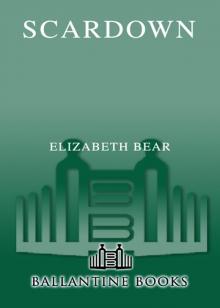 Scardown
Scardown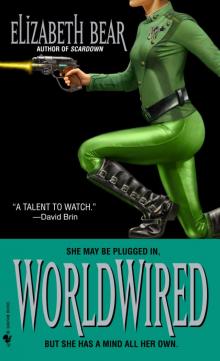 Worldwired
Worldwired Ancestral Night
Ancestral Night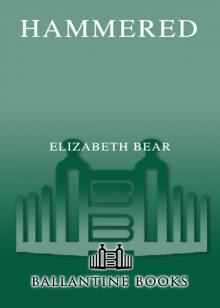 Hammered
Hammered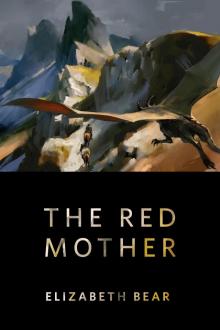 The Red Mother
The Red Mother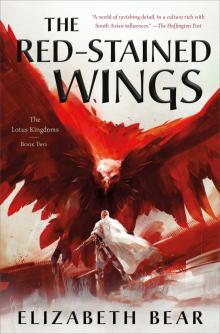 The Red-Stained Wings--The Lotus Kingdoms, Book Two
The Red-Stained Wings--The Lotus Kingdoms, Book Two Machine
Machine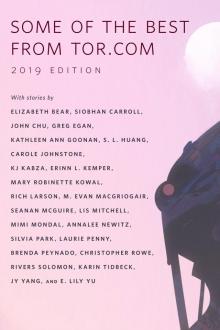 Some of the Best from Tor.com: 2019 Edition
Some of the Best from Tor.com: 2019 Edition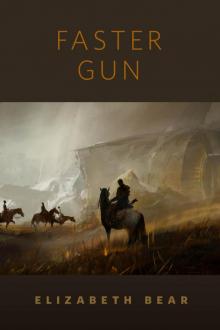 Faster Gun
Faster Gun In the House of Aryaman, a Lonely Signal Burns
In the House of Aryaman, a Lonely Signal Burns Stone Mad
Stone Mad Robots: The Recent A.I.
Robots: The Recent A.I.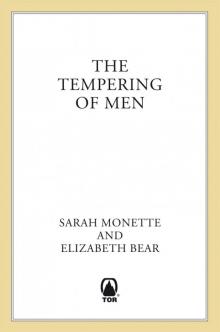 The Tempering of Men
The Tempering of Men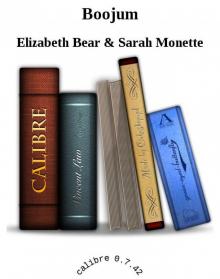 Boojum
Boojum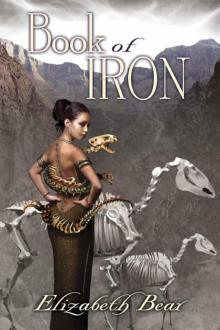 Book of Iron bajc-2
Book of Iron bajc-2 The Year's Best Dark Fantasy and Horror, 2010
The Year's Best Dark Fantasy and Horror, 2010 New Cthulhu 2: More Recent Weird
New Cthulhu 2: More Recent Weird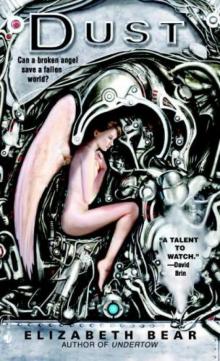 Dust jl-1
Dust jl-1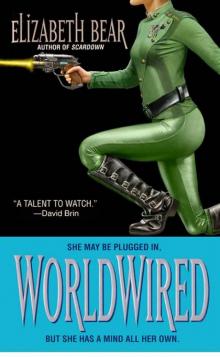 Worldwired jc-3
Worldwired jc-3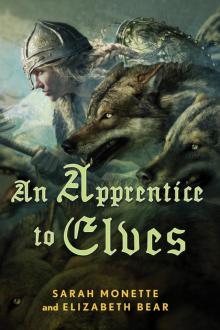 An Apprentice to Elves
An Apprentice to Elves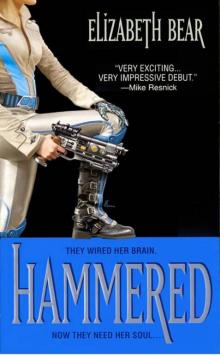 Hammered jc-1
Hammered jc-1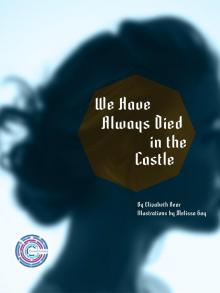 Crowd Futures: We Have Always Died in the Castle
Crowd Futures: We Have Always Died in the Castle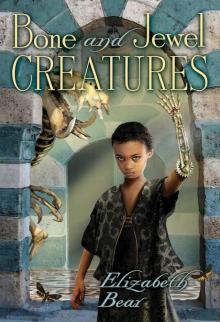 Bone and Jewel Creatures bajc-1
Bone and Jewel Creatures bajc-1 Carnival
Carnival Some of the Best from Tor.com: 2012 Edition: A Tor.Com Original
Some of the Best from Tor.com: 2012 Edition: A Tor.Com Original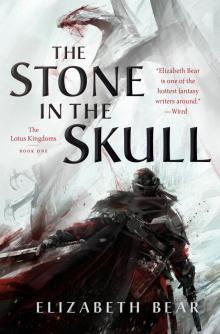 The Stone in the Skull
The Stone in the Skull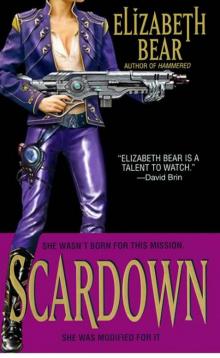 Scardown jc-2
Scardown jc-2 Hell and Earth pa-4
Hell and Earth pa-4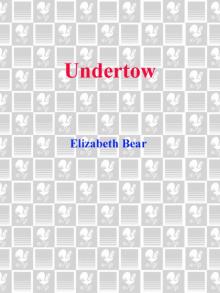 Undertow
Undertow Mermaids and Other Mysteries of the Deep
Mermaids and Other Mysteries of the Deep A Companion to Wolves
A Companion to Wolves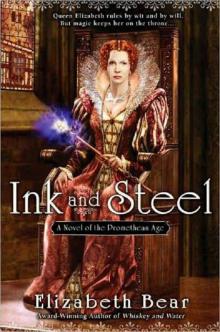 Ink and Steel pa-3
Ink and Steel pa-3